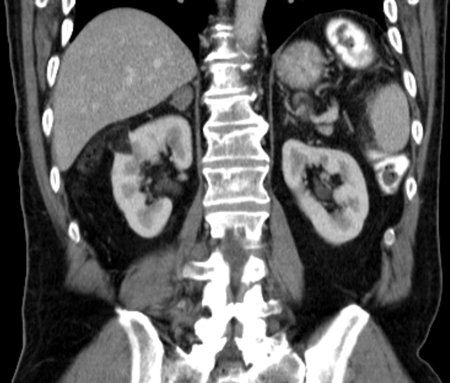Kidney Function May Affect Risk for Kidney, Bladder Cancer
A reduced estimated glomerular filtration rate (eGFR) was found to be associated with a significantly increased risk for renal and urothelial cancer, according to the results of a recently published study.
Renal angiomyolipoma: right kidney lesion in CT; source: Hellerhoff, Wikimedia Commons

A reduced estimated glomerular filtration rate (eGFR) was found to be associated with a significantly increased risk for renal and urothelial cancer, according to the results of a large, single-center study published in Journal of the American Society of Nephrology (JASN).
“While multiple studies have observed higher risks of cancer in persons with end-stage renal disease, the association of less severe kidney disease with cancer remains poorly understood,” study author Alan Go, MD, of Kaiser Permanente Northern California, said in a press release.
Go and colleagues conducted a study of about 1.2 million adults aged 40 years or older who received care at Kaiser Permanente Northern California and had measured serum creatinine concentration information available. All patients received care between 2000 and 2008, and none had a prior history of cancer, dialysis, or renal transplantation. Patients were followed for a median of 5.3 years.
The researchers were looking for associations between eGFR and renal cancer. Patient eGFR levels were classified as normal (eGFR 60 mL/min/1.73m2) and kidney failure (<15 mL/min/1.73m2).
With more than 6 million person-years of follow-up, 72,875 people were identified as having developed cancer. After multivariable adjustment, data indicated that people with an eGFR from 45 to 59 had a 39% increased risk for renal cancer compared with patients with an eGFR of 60 to 89. Those patients with an eGFR from 30 to 44 had an 81% increased risk for renal cancer.
Patients with the lowest eGFR, 30 or below, were found to have a twofold increased risk for renal cancer and a 48% increased risk for urothelial cancer compared with patients with an eGFR of 60 to 89.
In their discussion of the results, the researchers suggested several possible reasons for the increased cancer risk seen with low eGFR.
“Kidney dysfunction results in a state of chronic inflammation and oxidative stress, and such an inflammatory microenvironment may play a role in cancer development,” the researchers wrote. “Severe chronic kidney disease may additionally create a relative state of immunodeficiency, which could influence the development of cancer.”
These and other mechanisms require further study to better determine what may cause the link between low eGFR and increased renal cancer risk, according to the researchers.
In an editorial published with the study, Jonathan Hofmann, PhD, and Mark Purdue, PhD, of the National Cancer Institute, said that in light of the fact that there are no current screening protocols for kidney and bladder cancer, these results could be very important; however, they added that the results of this study alone are far from enough to recommend screening in these populations.
“This report by Lowrance et al is an important step forward in characterizing the relationship between chronic kidney disease and risk of renal cell carcinoma and other malignancies,” they wrote. “Studies such as this further support an etiologic role of impaired renal function in the development of renal cell carcinoma.”